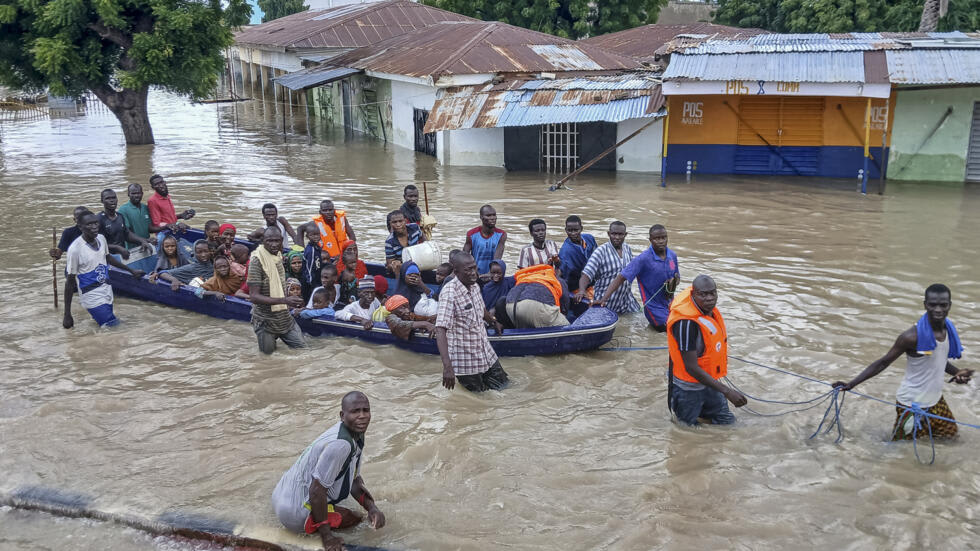By Destiny Uko
On May 28, the town of Mokwa in Niger State was submerged by a sudden flood that killed over 200 people and left many communities in a shambles. What began as a routine seasonal rainfall escalated into a disaster of historic proportions.
Entire villages were ripped apart, rooftops were barely visible above the rising water, and people clung to trees for safety against the currents. So ruinous was the flood that local leaders describe it as the worst in the region’s living memory.
The Mokwa tragedy presents a crucial moment for Nigeria to shift from reactive disaster management to proactive flood resilience.
Across the country, several states have managed to reduce flood-related fatalities through strategic investments, policy reforms and community engagement. Their strategies offer a roadmap for building long-term resilience against catastrophe.
In coastal Lagos, for example, flooding is a perennial trouble due to its dense population and poor drainage. The state has made considerable progress by investing in drainage infrastructure, building flood barriers and embarking on public awareness campaigns.
“We are not where we want to be yet, but our consistent investment in drainage infrastructure and public awareness is helping to reduce the yearly toll of urban flooding,” said Tokunbo Wahab, Lagos State Commissioner for the Environment and Water Resources.
Similarly, in Jigawa, the government has constructed 85 kilometres of embankments across 35 communities in eight local government areas.
At a height of 2.5 metres and a thickness of four metres, these embankments are designed to protect vulnerable areas from flooding.
“Our embankments are not just structures; they are lifelines for our rural communities,” said Engineer Gambo Umar, Jigawa State’s Director of Environmental Protection
States like Yobe and Kaduna are proving how financial support and relocation efforts can protect lives before and after flood strikes.
In Yobe, the government disbursed ₦1.4 billion to assist 25,500 flood victims across 17 local government areas. The funds helped displaced families recover and rebuild their lives.
“We must not wait for disaster to strike,” said Governor Mai Mala Buni. “Our investments are preventive and responsive.”
Kaduna took a different approach—dredging River Kaduna to reduce water overflow and offering ₦35,000 relocation assistance to residents in high-risk areas.
Educating and mobilizing communities: The Benue example
Benue State has prioritised public awareness, encouraging residents in flood-prone areas to relocate before disaster strikes. The government cleared drainage systems in urban areas and provided temporary shelters for affected individuals.
“Preparedness begins with information. We are doing everything we can to alert and support our people before it’s too late,” said Emmanuel Shior, Executive Secretary, Benue State Emergency Management Agency (SEMA).
Leveraging NGOs for broader impact
Non-governmental organisations play vital roles in filling gaps in disaster response and community resilience. One prominent example is UNICEF’s response to the 2022 catastrophic floods in Anambra State. They provided crucial supplies such as chlorine for water disinfection, psychosocial support, child nutrition care, and mobile healthcare.
The United Nations Development Programme (UNDP), in partnership with the German Government and the Insurance Development Forum (IDF), launched a €1.6 million flood insurance project in Lagos. The policy provides rapid payouts based on flood severity, which can then be used for emergency response, infrastructure repair, or direct cash transfers to affected families.
Local non-profits like the Rural Watch Africa Initiative and Women Inspiration Development Network delivered essential aid—food, hygiene kits and clean water—to vulnerable groups, especially women and farmers.
The Nigerian Red Cross Society (NRCS) coordinated nationwide aid efforts, installed 12 boreholes and provided relief kits of ₦100,000 worth to thousands of households.
The flooding in Mokwa is a national tragedy, but it need not be a recurring headline. Examples of proven strategies already exist. The challenge now is scaling these solutions and making them the norm rather than the exception.
By learning from states that have successfully implemented infrastructure improvements, community engagement, and proactive relief programs, Nigeria can develop a comprehensive approach to reduce flood fatalities.
The catastrophic flood in Mokwa, Niger State, which claimed over 200 lives, underscores the urgent need for Nigeria to transition from reactive disaster management to proactive flood resilience. While this tragedy is a wake-up call for the nation, successful strategies from other states offer a roadmap for building long-term resilience against such disasters. In Lagos, investments in drainage infrastructure and public awareness have reduced the impact of urban flooding. Jigawa has constructed embankments to protect vulnerable areas, while Yobe and Kaduna provide financial support and relocation efforts to minimize flood fatalities. Benue State emphasizes public awareness and preparedness, focusing on relocating residents from flood-prone areas.
Non-governmental organizations play a crucial role in disaster response, with entities like UNICEF and the Nigerian Red Cross Society providing essential aid and support. Collaborative efforts like the UNDP and the German government’s €1.6 million flood insurance project in Lagos highlight how partnerships can enhance flood response and resilience. The Mokwa flooding is a national tragedy, but learning from successful strategies across Nigeria can help scale effective solutions and make proactive flood management the norm.






